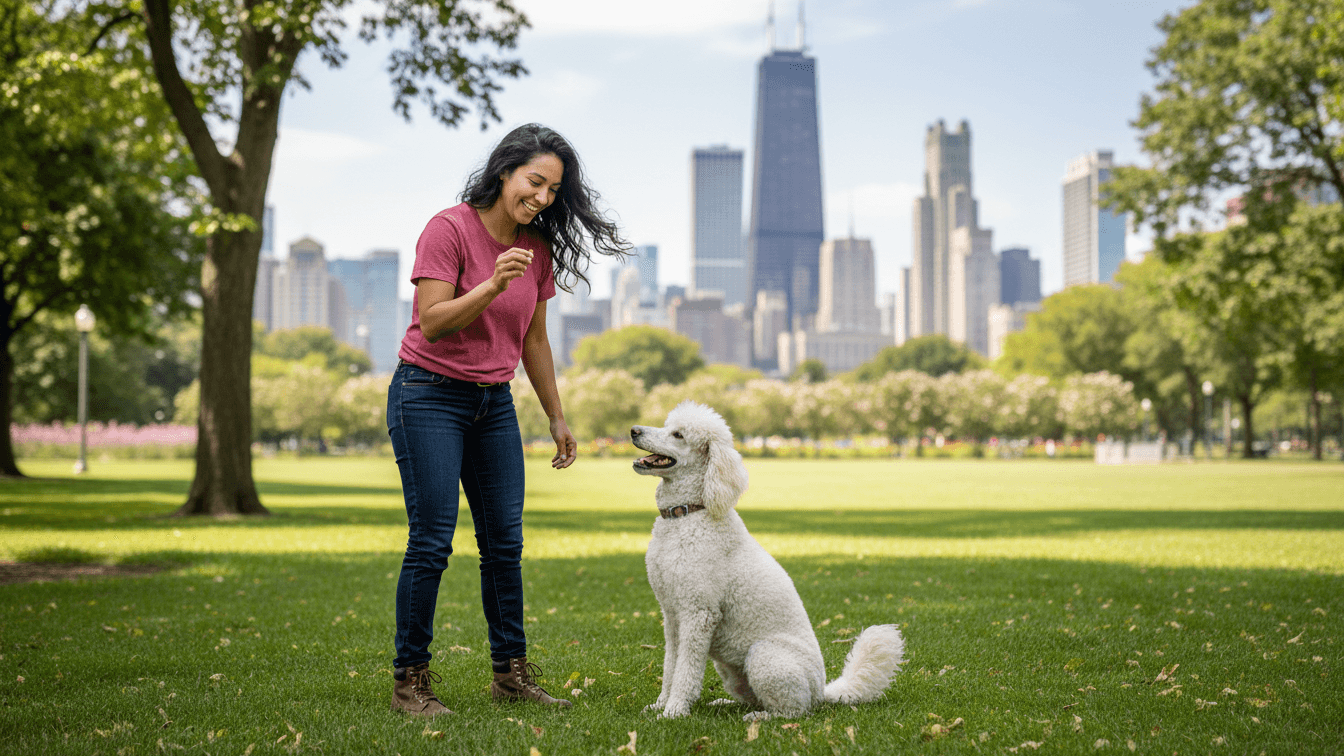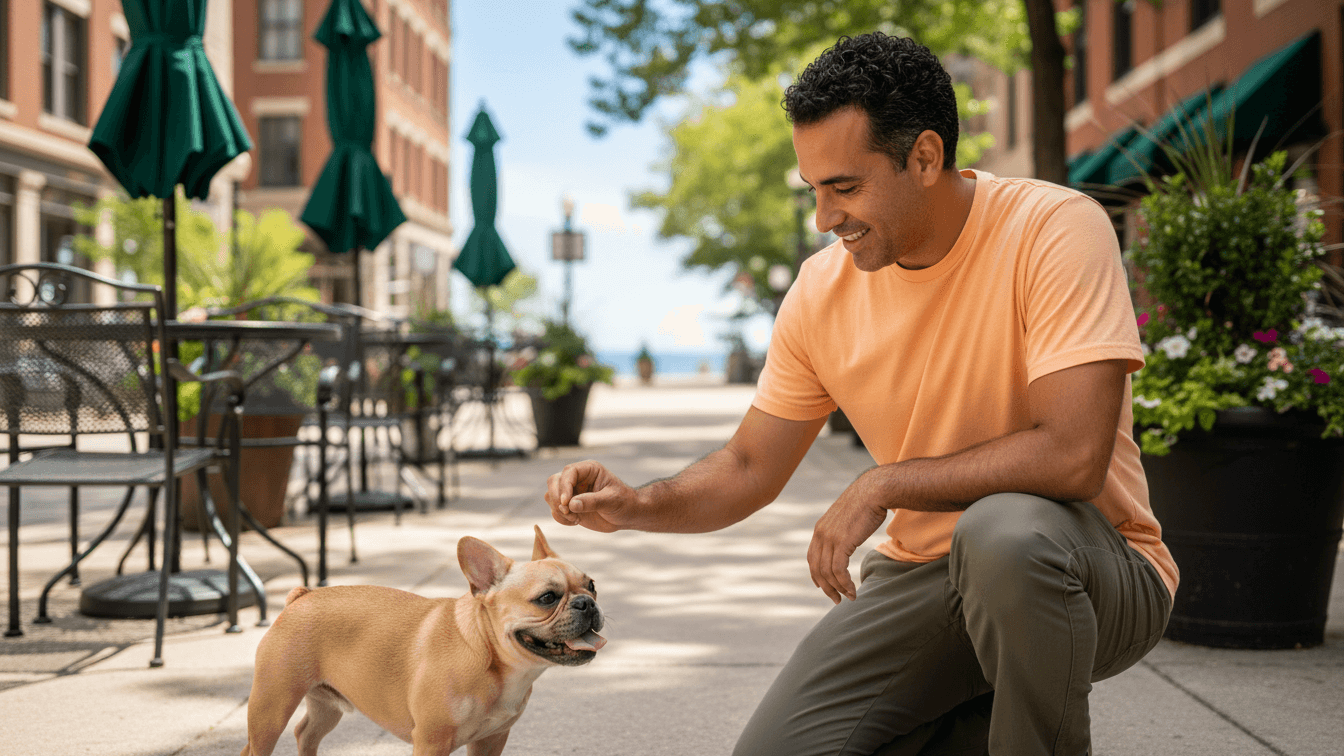Your Complete Guide to Choosing a Dog Trainer in Chicago
Living with a dog in Chicago means navigating crowded sidewalks, surviving long winters indoors, and keeping your pup calm around the constant noise of the L trains. Your dog needs to handle all of this confidently, from loose-leash walks through Lincoln Park to staying polite when crowds pack Millennium Park on summer weekends.
Chicago sits in Cook County, where local ordinances and state regulations shape how you’ll train and care for your dog. When you find a professional dog trainer who understands these rules and the unique challenges of city living, you’ll get better results both at home and out in your neighborhood.
How to Choose the Right Trainer
Start by looking for someone who uses positive reinforcement training and can set realistic goals for your Chicago lifestyle. This means your dog should learn to walk calmly past street performers on Navy Pier, stay focused near outdoor restaurant patios in Wicker Park, and handle crowded el platforms without reacting to every sudden movement.
Credentials give you a quick way to compare trainers’ experience levels. Common dog trainer certifications include KPA-CTP, CPDT-KA, or IAABC-CDBC for behavior problems. If your dog has serious aggression issues, look for someone with CBCC-KA or a science-based program like CTC.
In-home dog training works great for puppy manners, door greetings, and building confidence around apartment building noises. Group classes make sense once your dog can focus around other dogs, especially before you try busy spots like the Riverwalk or Lakeshore Trail.
Common Dog Training Methods Explained

Reward-based methods build the trust you want while creating lasting behavior changes. They also help you follow Chicago’s municipal code about keeping dogs under control in public.
Basic obedience covers sit, down, stay, place, recall, and leash training so your dog can handle walks, brewery patios, and park visits without pulling or jumping on people. In a city as dense as Chicago, these skills aren’t optional.
Puppy training focuses on socialization, potty training, bite control, crate comfort, and early leash work. Starting with short, positive training sessions prevents bad habits from forming in the first place. This matters even more when you’re housebreaking a puppy in a high-rise apartment.
Behavior modification addresses fear, reactivity, resource guarding, or separation anxiety through careful desensitization and counterconditioning. For serious cases, ask if your trainer works with local veterinarians who understand behavior.
Private lessons and in-home sessions let you customize everything around your daily routines, while day training can speed up results when you’re short on time or dealing with complex issues like aggressive dog training needs.
Dog training classes help your dog practice good manners around other dogs and people. The best classes give dogs plenty of space, screen participants carefully, and teach calm behavior rather than just excitement.
Specialized training like therapy dog training or service dog training requires extra structure, public-access skills, and a very clear step-by-step training program. Chicago’s diverse environment makes it an ideal place to prepare therapy dogs for hospital and school visits.
Stay away from trainers who use fear, intimidation, or pain to get results. Humane methods are safer for everyone, easier to maintain long-term, and much better for keeping peace with your neighbors in a multi-unit building.
Average Cost of Dog Training in Chicago (Updated for 2025)
Prices around Chicago and Cook County depend on the trainer’s experience, how long sessions last, and where the training happens. Here’s what most local pet owners are paying in 2025.
| Service Type | Average Cost (Chicago/Cook County) |
|---|---|
| Puppy classes (4-6 weeks) | $175-$325 total |
| Group obedience classes (4-6 weeks) | $180-$350 total |
| Private lessons (60-90 min) | $125-$225 per session |
| In-home coaching packages (4-6 visits) | $500-$1,100 total |
| Day training (trainer works your dog + handoff) | $500-$1,200 per week |
| Behavior consult for reactivity/anxiety (initial) | $175-$300 |
| Board and train (2-4 weeks) | $2,500-$5,500 total |
You’ll probably pay higher rates in neighborhoods like Lincoln Park and Lakeview, and expect premium pricing for complex behavior work. Many trainers offer a free consultation or free evaluation before you commit to a full training program.
Make sure you understand what’s included, how the trainer tracks progress, and whether dog training services cover follow-up support after your initial sessions end.
Questions to Ask a Potential Dog Trainer
- What training methods do you use, and how do you keep sessions positive and low-stress?
- What credentials do you have, like KPA-CTP or CPDT-KA? Do you keep up with continuing education such as CPDT-KSA?
- How will you customize the training plan for my dog’s specific needs and our Chicago lifestyle?
- Do you offer in-home visits, group classes, or day training, and which approach fits my goals best?
- How will we measure my dog’s progress and know when to add more distractions like traffic or crowds?
- What are the total costs, including any travel fees within Cook County, and what’s your cancellation policy?
- Do you carry liability insurance, and can you show me proof?
- For behavior problems, will you work with my veterinarian if needed?
- What should I practice between training sessions to help my dog keep improving?
- Have you worked with dogs in high-rise buildings or apartments before?
Local Chicago Rules and Considerations
Chicago enforces strict leash laws and animal control ordinances to keep parks and neighborhoods safe for everyone. Cook County follows Illinois state public health requirements too.
Leashes are required in all public spaces except inside designated dog-friendly areas and dog parks. The Chicago Municipal Code requires leashes to be no longer than 6 feet in parks and on streets. Breaking this rule can result in fines starting at $200.
Illinois law requires current rabies vaccination for all dogs over four months old. You must keep proof of vaccination, and your dog should wear a rabies tag. Local veterinarians provide these services, and you can find more details through the Illinois Department of Public Health.
Excessive barking can be considered a nuisance under Chicago’s noise ordinances. Work with your trainer on alert barking and separation anxiety before neighbors start complaining or filing reports with 311. This becomes especially important in apartment buildings and condos where sound carries.
If your trainer wants to use city parks for commercial training sessions, they may need special permits and proof of liability insurance from the Chicago Park District. Ask about this before booking outdoor group classes.
Illinois doesn’t require special licenses for dog trainers, but if a business boards dogs for payment, they must follow the state’s Animal Welfare Act and register with the Illinois Department of Agriculture. This mainly affects board and train programs.
Chicago requires all dogs to be registered with the city. You’ll need a current rabies certificate and proof of spay or neuter to get your dog license. Visit the Chicago Animal Care and Control website for registration information and fees.
Local Chicago Resources for Dog Owners
These spots give you great places to practice polite manners, work on recalls, and provide safe enrichment for your dog. Always follow the posted rules and etiquette guidelines.
- Montrose Dog Beach offers one of the few legal off-leash areas in Chicago, perfect for recall practice and socialization with other dogs in a controlled environment.
- Grant Bark Park in the South Loop provides a fenced area split into small and large dog sections, making it ideal for training for dogs who need to build confidence.
- Wiggly Field in Lakeview offers a fully enclosed space where you can practice obedience training without worrying about your dog bolting into traffic.
- The 606 Trail allows leashed dogs and gives you nearly three miles to practice loose-leash walking around joggers, cyclists, and other distractions.
- Chicago Lakefront Trail welcomes leashed dogs along its 18-mile path, offering countless opportunities to work on focus and impulse control around runners, bikes, and wildlife.

FAQs
How much does in-home dog training cost?
Most Chicago trainers charge $125-$225 per in-home visit, with discounts available when you buy packages. Behavior problems typically start at the higher end of that range, especially in neighborhoods farther from the trainer’s base location.
Is in-home dog training worth it?
Absolutely, because you’re working on problems exactly where they happen. Your trainer can fix door manners, jumping on guests, counter-surfing, and hallway reactivity right at home, then step outside to practice leash skills on your actual neighborhood sidewalks with real city distractions.
Can you pay someone to house train your dog?
Yes, many trainers offer puppy training programs that include potty training, crate routines, and daily schedules. Day training can speed up the process while teaching you how to maintain the progress, which helps when you’re dealing with Chicago winters and need to get potty training right quickly.
What is the 3-3-3 rule for dog training?
This is a helpful timeline for new or adopted dogs: expect about 3 days for your dog to decompress, 3 weeks to learn your routines, and 3 months to feel completely settled. Good training programs work with this natural adjustment period rather than rushing results.
How long will it take to reach my training goals?
Most puppies and friendly adult dogs show solid progress within 4-8 weeks if you practice daily. Fear, reactivity, or separation anxiety typically requires several months of careful behavior modification with gradual increases in difficulty. City dogs often need extra time to desensitize to urban stimuli.
What should I bring to group classes?
Pack a flat collar or harness, a 6-foot leash, high-value treats, water, and current vaccination records if your trainer requests them. Leave retractable leashes at home for safety reasons, especially in crowded Chicago training facilities.
What’s the leash law in Chicago?
Dogs must be leashed and under control in all public areas, except inside designated off-leash dog parks and beaches. The Chicago Municipal Code specifies a maximum 6-foot leash in parks and on streets. Violations can result in fines starting at $200.
Do I need a dog license in Chicago or Cook County?
Yes, Chicago requires all dog owners to register their pets with the city. You’ll need a current rabies certificate and proof of spay or neuter status. Licenses must be renewed annually, and fees vary depending on whether your dog is altered. Visit Chicago Animal Care and Control for registration.
What shots does my dog need in Cook County or Illinois?
Rabies vaccination is required throughout Illinois for all dogs over four months old. Your veterinarian may also recommend distemper-parvo and bordetella based on your dog’s lifestyle. Check state guidelines through the Illinois Department of Public Health website.
Are dog trainers required to be licensed in Chicago or Cook County or Illinois?
No special trainer licenses exist in Illinois. Trainers follow normal business regulations, but if they offer board and train services, their facility must register with the Illinois Department of Agriculture under the state’s Animal Welfare Act.
Where can I practice off-leash recall?
Use fenced dog parks in Chicago like Wiggly Field or Grant Bark Park to keep things safe and legal. Montrose Dog Beach is another great option during warmer months. Try visiting during quieter hours when you’re starting out to help your dog build confidence.
Which dog parks allow training around Chicago?
Wiggly Field in Lakeview, Grant Bark Park in the South Loop, and Montrose Dog Beach all allow off-leash practice within their designated areas. These fenced spaces let you work on recalls and socialization safely. Always check posted hours and rules before planning training sessions.
What beaches or trails allow dogs for training?
Montrose Dog Beach is Chicago’s only legal off-leash beach area and welcomes dogs year-round. The Lakefront Trail allows leashed dogs along its entire 18-mile length, perfect for leash training and building focus around runners, cyclists, and other dogs. The 606 Trail also permits leashed dogs and offers a car-free environment for practice.
How do I help my dog adjust to apartment living?
Work with a certified dog trainer on crate training, settling behaviors, and sound desensitization to handle elevator dings, hallway noises, and neighbor activity. Practice door manners so your dog doesn’t bark at every person walking past. Start early with potty training routines that account for elevator trips and lobby crossings.
What if my dog is reactive on the L or buses?
Focus on desensitization and counterconditioning with a trainer experienced in urban reactivity. Start by practicing near train stations without boarding, then work up to short trips during quiet times. Keep treats handy and create positive associations with the sounds and movements your dog finds scary.
Can I train my dog to handle Chicago winters?
Yes, but you’ll need to adapt your training schedule. Work on indoor exercises during extreme cold, teach your dog to wear booties for salt and ice protection, and maintain potty training despite weather challenges. Many expert dog trainers offer indoor private lessons during winter months to keep progress on track.
The right combination of thoughtful planning, humane methods, and consistent practice around Chicago’s parks and neighborhoods will help your dog become a confident, well-behaved dog. Whether you’re in Logan Square, Lincoln Park, or anywhere else in the city, look for training sessions that address the specific challenges of urban living. If credentials matter to you, don’t hesitate to ask about dog trainer certifications and how your trainer stays current with new techniques.
